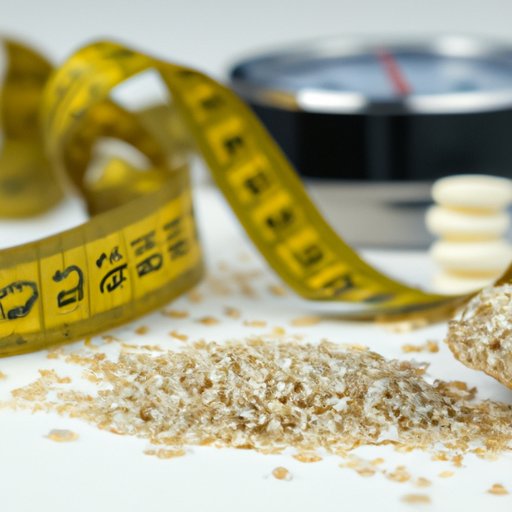
Introduction
Have you ever noticed that despite eating healthily and exercising regularly, weight gain can still be difficult to manage? This is where hormones come into play. Hormonal weight gain is a real issue affecting many people today, particularly women. In this article, we will explore the science behind hormonal weight gain, debunk common myths about it, discuss it in men, and offer natural solutions to manage it.
Exploring the Science Behind Hormonal Weight Gain
Hormones play a crucial role in a person’s metabolism and maintaining a healthy weight. Hormones regulate appetite, energy levels, and fat storage in the body. Hormonal imbalances, such as an underactive thyroid and insulin resistance, can cause weight gain and make it difficult to lose weight. Studies have shown that estrogen, cortisol, and insulin are key hormones that affect weight gain in women.
Estrogen is responsible for regulating fat storage in the body and maintaining healthy metabolism. With age, estrogen levels drop, leading to weight gain in women. Cortisol is the stress hormone, and when it’s produced in excess due to chronic stress, it can lead to increased fat storage, particularly in the midsection. Insulin is responsible for regulating blood sugar levels and fat storage. When insulin levels are constantly elevated due to excessive carbohydrate consumption, the body can develop insulin resistance, leading to weight gain.
Hormonal Weight Gain: The Struggle Is Real
Many individuals struggle with weight gain due to hormone imbalances, and it can be frustrating and demotivating. These imbalances can lead to increased cravings, energy fluctuations, and other symptoms that make it challenging to maintain a healthy weight. Some women may experience weight gain during pregnancy and menopause, where hormonal levels are temporarily disrupted.
However, it’s important to note that hormonal weight gain is not a death sentence and can be managed with proper treatment and lifestyle adjustments.
Debunking Myths About Hormonal Weight Gain
There are common misconceptions about hormonal weight gain, such as it’s a natural part of aging or occurs due to a lack of willpower. However, scientific research has debunked these myths. Age-related hormonal changes do not necessarily lead to weight gain, and overall health is more important than strict diets and excessive exercise.
Another myth is that bioidentical hormone replacement therapy (BHRT) is the only solution for hormonal imbalances. BHRT can be beneficial for some individuals, but it’s not the only way to manage hormonal weight gain. Proper nutrition, exercise, and stress management can also help manage hormonal imbalances.
Hormonal Weight Gain in Men
Hormonal weight gain is often associated with women, but it’s a problem that affects men as well. Men’s hormonal imbalances can also lead to weight gain, particularly around the midsection. Testosterone plays a crucial role in regulating muscle mass and metabolism in men. Aging can lead to low testosterone levels, making it harder to maintain muscle mass and lose weight.
Other hormonal imbalances that can cause weight gain in men include insulin resistance and cortisol imbalances due to chronic stress.
How to Manage Hormonal Weight Gain Naturally
While medication and hormone therapy can be beneficial, it’s always better to try natural methods first. Hormonal weight gain can be managed naturally by making simple lifestyle changes such as:
- Eating a healthy diet: Eating nutrient-dense whole foods like fruits, vegetables, lean proteins, and healthy fats can aid in managing hormonal weight gain. Avoiding processed junk foods and sugary drinks can also help manage insulin imbalances.
- Regular exercise: Physical activity can boost metabolism, reduce stress, and maintain muscle mass. Combining strength training and cardio exercises can create a potent effect in the body, helping to manage weight gain.
- Stress management techniques: Chronic stress can cause cortisol imbalances, adversely affecting weight gain. Incorporating stress-reducing techniques like meditation, deep breathing, yoga, and tai chi can help manage stress, preventing cortisol imbalances
Conclusion
Hormonal weight gain can be frustrating, but it’s essential to understand its causes and how to manage it effectively. We have explored the science behind hormonal weight gain, including personal accounts of individuals who have faced it. We have also debunked common myths about this issue and discussed management in men. Finally, we provided natural solutions involving making simple lifestyle changes through proper nutrition, regular exercise, and stress management techniques. Just remember, hormonal weight gain is manageable with the right treatment, diet, and lifestyle changes.




